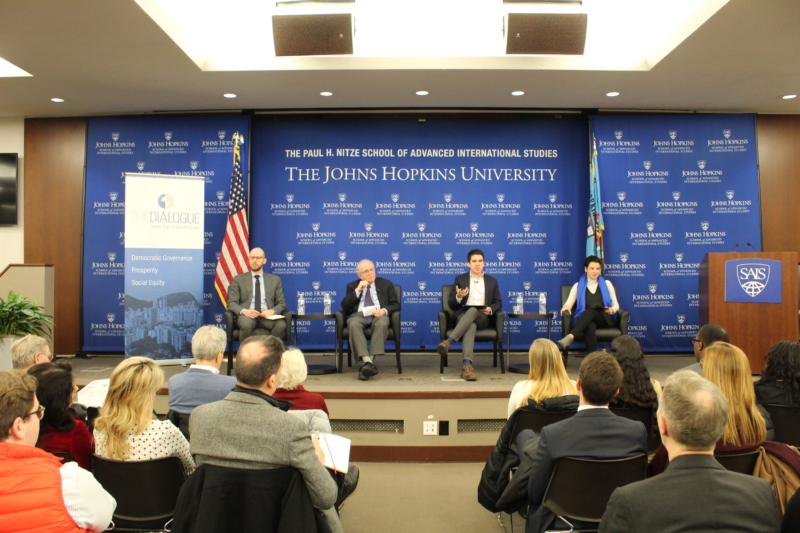Rising Brazil: The Choices Of A New Global Power
What should we expect from a newly powerful Brazil? Does the country have the capacity and leadership to be a central actor in addressing critical global and regional problems?
On February 11th, the Inter-American Dialogue and Johns Hopkins School of Advanced International Studies (SAIS) hosted the third event in a series dedicated to Brazil. The first event, held on September 25, 2018 looked at scenarios for the 2018 Brazilian election; the second event, held on October 30th, 2018 tried to identify what Jair Bolsonaro’s policy priorities would be; and the third event focused on foreign policy in Bolsonaro’s Brazil. This event was moderated by Monica de Bolle, director of Latin American Studies at SAIS, and featured commentary by Peter Hakim, president emeritus of the Inter-American Dialogue, Filipe Campante, Bloomberg distinguished associate professor at Johns Hopkins University, and Roberto Simon, senior director for policy at the Americas Society/Council of the Americas.
Campante focused on what he described as “competing factions” within the Bolsonaro Administration, more specifically the far right or “anti-global” group, which includes foreign minister Ernesto Araújo, and the military, which is more pragmatic, and it is not clear who will come out ahead. Campante noted that Brazil does not have a history of these types of competing groups within one government, so it only added to the unpredictability of Bolsonaro’s policy.
Hakim focused his comment primarily on the US-Brazil relationship, which he described as a “courtship.” He noted that almost everyone in the Trump Administration, including President Trump himself, have made positive comments about Bolsonaro government, and Bolsonaro has made clear statements trying to align himself with the US, but nothing concrete has been proposed. One issue that Hakim observed would be how Bolsonaro would balance an enhanced relationship with the US without harming the Brazil-China relationship. Brazil trades almost 50-60% more with China than with the US and Bolsonaro’s largest support in the legislature comes from the ruralistas, or agricultural, “rural” caucus, so a freeze of trade on China seems unlikely.
Simón largely agreed with the statements made by Campante and Hakim, and further emphasized the important role the ruralistas would play with respect to trade and foreign policy. The event concluded with a Q&A session with the audience.
What should we expect from a newly powerful Brazil? Does the country have the capacity and leadership to be a central actor in addressing critical global and regional problems?
President Lula da Silva triumphantly announced that he and his Turkish counterpart had persuaded Iran to shift a major part of its uranium enrichment program overseas—an objective that had previously eluded the US and other world powers. Washington, however, was not applauding.
An upcoming meeting between Presidents Obama and Rousseff should not be expected to produce dramatic news or unexpected major breakthroughs.
 Missy Reif/Inter-American Dialogue
Missy Reif/Inter-American Dialogue